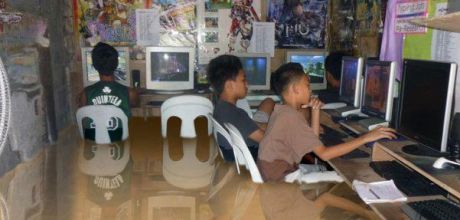In another one of its infomercial articles that it would like to pass off to the average sucker as a news “report”, ABS-CBN trumpeted another one of those dubious “achievements” Filipinos owe mainly to their enormous population — our undisputed place in the global scheme of things as the “social media capital of the world”.
Standing ovation folks.
Who else would lead the charge to the grandstand to accept the medal but one of the biggest internet service providers in Waterworld…
| SUPPORT INDEPENDENT SOCIAL COMMENTARY! Subscribe to our Substack community GRP Insider to receive by email our in-depth free weekly newsletter. Subscribe to our Substack newsletter, GRP Insider! Learn more |
Smart Communications Inc. cited yesterday a study conducted by social-media monitor Semiocast, which analyzed 517 million Twitter profiles. It said the Philippines now has around 9.5 million registered Twitter users. The country trails Spain and is one step ahead of Turkey.
At the height of Tuesday’s intense rain and flooding all over the country, hundreds of thousands of Filipinos trooped to Twitter to spread critical flood information, as well as to mobilize rescue-and-relief operations.
But of course…
With a strong and resilient network like Smart, you’re sure to receive every tweet, every update, and you can rely on your network not dying out on you when you need connectivity the most,†said [Smart chief wireless advisor Orlando Vea].
Holy mutual back-scratching, Batman!

There is indeed lots of money to be made in times of tragic disaster and chronic across-the-board social and governance dysfunction. Already, Smart Communications is likely making millions having cornered a deal with the Department of Science and Technology’s Project NOAH — the Philippines’ newly-minted state-of-the-art disaster anticipation system — for its supply of data transmission and networking equipment and services to link its arrays of rainfall detection sites.
The plot thickens still.
Smart Communications is a wholly-owned subsidiary of Philippine Long Distance Telephone company (PLDT) whose chairman, Manuel V Pangilinan is — get this — chairman of the Philippine Disaster Recovery Foundation (PDRF). The PDRF was a lead facilitator in bringing to the negotiation table the Philippine Government and the World Bank to agree on an initiative to develop a new flood control masterplan for Metro Manila.
Verrrrry interestinggggg…
To be fair, social media technology had played a key part in disaster response in this most recent (and most likely not the last) of Manila’s man-made disasters. But the big role social media and private sector capability played this week simply highlights the lack of basic systemic preparedeness every government worth the taxes paid to them should exhibit. For more sober insight on that matter we shouldn’t be relying on media outlets in apparent cahoots with Big Telco to tell us what is being done right and what is being done wrong. Perhaps we should, instead, refer to the insight provided by world-class national governments that have strong track records of learning from their own disaster management experience — such as that of the Australian Government referring to one of their reports, Using social media to build community disaster resilience…
According to the Royal Commission report, “Shared responsibility does not mean equal responsibility……there are some areas in which the government should assume greater responsibility than the community. For example, in most instances fire authorities will be more capable than individuals when it comes to identifying risks associated with a fire; the government should therefore assume greater responsibility for working to minimise those risksâ€.
The Australian Government stresses in its National Strategy for Disaster Resilience (COAG, 2011) that “achieving disaster resilience is not solely the domain of emergency management agencies; rather, it is a shared responsibility across the whole of societyâ€.
Shared responsibility. The mounds of garbage piling up along Roxas Boulevard have become a monument to the tragic failure of Filipinos to live up to this simple principle.
Meanwhile, we gleefully tweet our troubles away…
benign0 is the Webmaster of GetRealPhilippines.com.
It is just another media-stunt for the oligarchs of this country. They could have just slashed off SMART at this point in time and placed them on the pedestal AFTER the incidences. Nakakasuka!
And for some weird reason, SMART was working the whole time, when on normal conditions it barely works.
Hmmm…may malansa…
Disaster Anticipation System… sounds complicated. Just what is it for anyway. All we need to anticipate disasters are really available to all. I remember the days when I tried to conceive projects for our company so that I’ll make extra few back along the way at the same time highlighting to my bosses that I’m working.
A country full of attention whores using their attention whoring for profit? GENIUS!